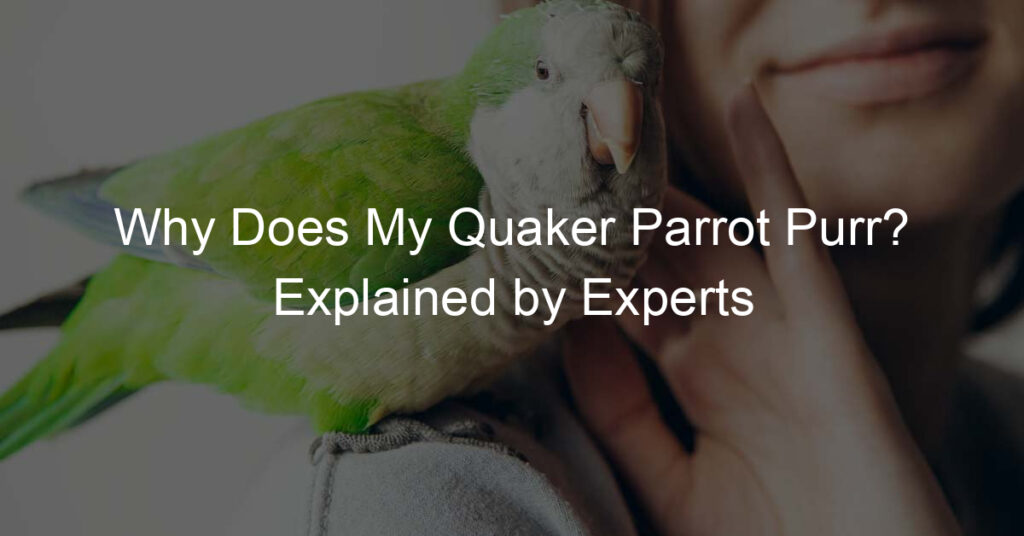If you’re a proud owner of a Quaker parrot, you may have noticed that your feathered friend sometimes makes a low, rumbling sound that resembles a cat’s purr. You’re probably ask yourself why does my Quaker Parrot purr?
While it may be difficult to understand what your bird is trying to communicate with its vocalizations, there are a few key factors that can influence why and when your Quaker parrot purrs.
Understanding Quaker Parrots Quaker parrots, also known as monk parakeets, are intelligent and social birds that are native to South America. They are highly vocal and use a variety of sounds to communicate with their flock members.
While they are not known for their ability to mimic human speech like some other parrot species, Quaker parrots are still capable of producing a wide range of vocalizations, including chirps, squawks, and purrs.
Quaker Parrot Purring When Quaker parrots purr, they are often showing that they feel safe, comfortable, and content with their environment and their companions.
Purring is a sign of relaxation and happiness in many animals, and Quaker parrots are no exception.
However, it’s important to note that not all Quaker parrots will purr, and some may only do so under certain circumstances or with certain people.
Why Does My Quaker Parrot Purr?
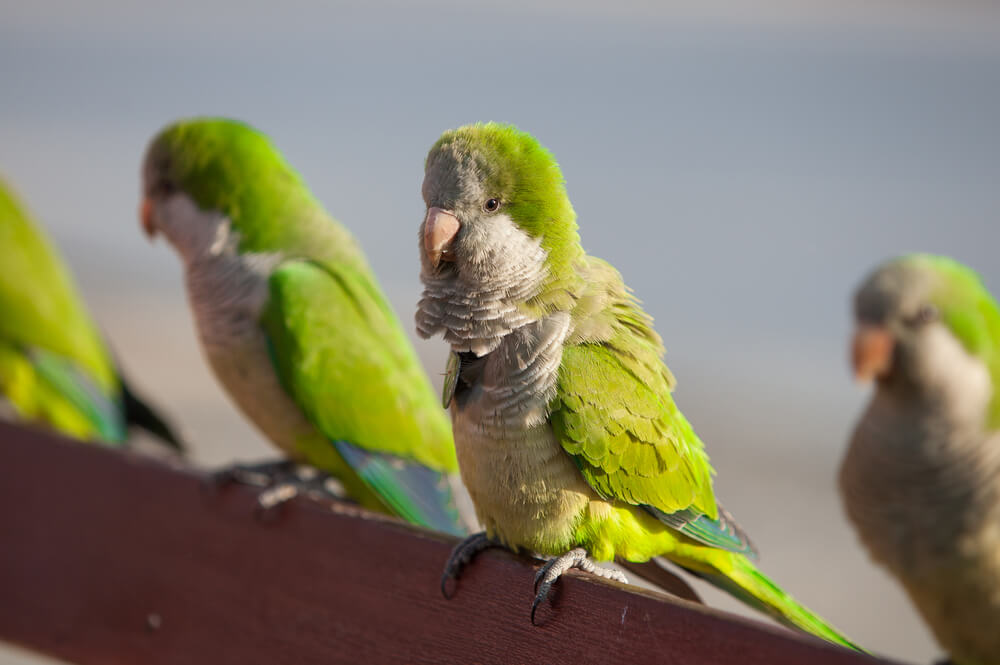
Quaker Parrot Characteristics
Quaker parrots, also known as monk parakeets, are small to medium-sized birds that are native to South America. They are a popular pet bird because of their playful and social nature, as well as their ability to mimic human speech.
Here are some key characteristics of Quaker parrots:
- Size: Quaker parrots typically grow to be around 11 inches long from beak to tail.
- Color: They have a green body with grey feathers on their forehead, cheeks, and throat.
- Lifespan: Quaker parrots can live up to 25 years in captivity with proper care.
- Diet: They are omnivores and eat a variety of foods including seeds, fruits, vegetables, and insects.
- Vocalizations: Quaker parrots are known for their loud calls and ability to mimic human speech.
Quaker Parrot Behavior
Quaker parrots are highly social birds and thrive on interaction with their owners. They are playful and energetic, and enjoy toys and activities that challenge their intelligence.
Here are some common behaviors of Quaker parrots:
- Purring: Quaker parrots can produce a low, rumbling sound that is often compared to the contented rumbling of a cat. This sound is a sign of relaxation and contentment.
- Chattering: Quaker parrots are quite chatty and enjoy narrating as they go about their daily business. This can be a compilation of noises.
- Body language: Quaker parrots use body language to communicate their emotions and intentions. For example, fluffing up their feathers and closing their eyes can be a sign of contentment, while flapping their wings and squawking can indicate excitement or frustration.
- Playfulness: Quaker parrots love to play and enjoy toys that challenge their intelligence. Providing toys and activities that stimulate their minds can help keep them happy and healthy.
- Bonding: Quaker parrots are social birds that form strong bonds with their owners. Spending time with your bird and providing plenty of attention and affection can help strengthen this bond.
Overall, Quaker parrots are delightful and intelligent birds that make great pets for those who are willing to provide them with proper care and attention.
Quaker Parrot Purring
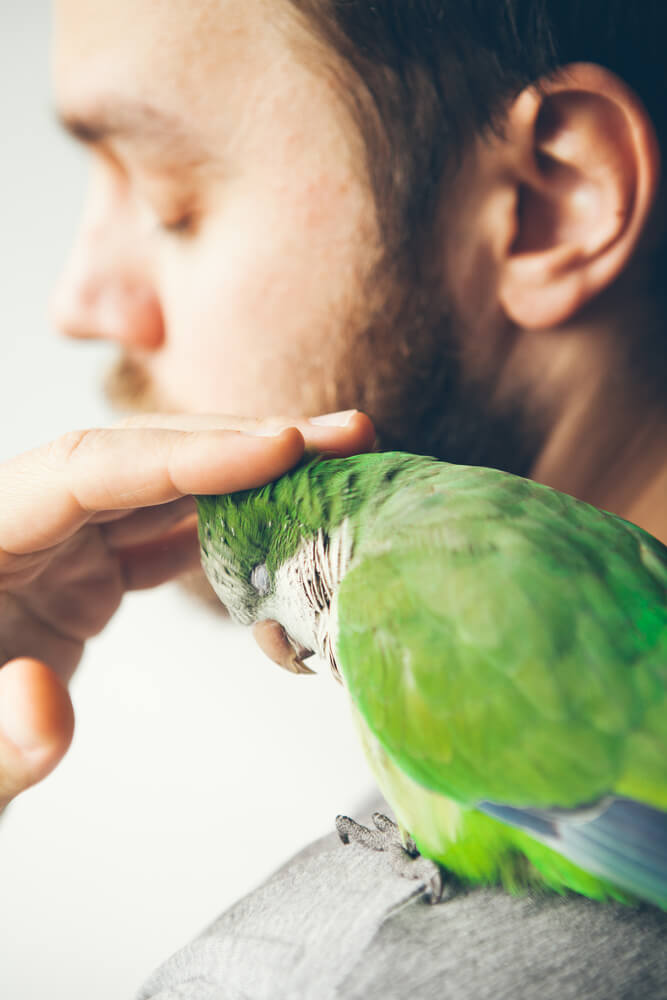
If you are a proud owner of a Quaker parrot, you might have noticed that your bird occasionally makes a rumbling sound that is similar to a cat’s purr.
In this section, we will explore the reasons why Quaker parrots purr and how they produce this sound.
What Does Purring Mean?
Purring is a sign of contentment and relaxation in Quaker parrots. When they feel safe and comfortable in their environment, they may purr as a way to express their happiness and satisfaction.
Purring can also be a sign of submission, as the bird is showing that it trusts and feels comfortable with its human companion.
How Do Quaker Parrots Purr?
Quaker parrots produce the purring sound by vibrating their syrinx, which is the vocal organ located at the base of their trachea.
The syrinx is made up of two sets of membranes that vibrate together to produce sound. When Quaker parrots purr, the membranes vibrate rapidly, creating a low, rumbling sound.
It’s important to note that not all Quaker parrots purr, and some may purr more often than others.
Additionally, purring is just one of many vocalizations that Quaker parrots make. They are known for their chatty nature and can make a variety of sounds, including chirps, squawks, and whistles.
Purring is a natural behavior in Quaker parrots that indicates their contentment and relaxation. By understanding why Quaker parrots purr and how they produce this sound, you can better communicate with and care for your feathered friend.
Factors Influencing Quaker Parrot Purring
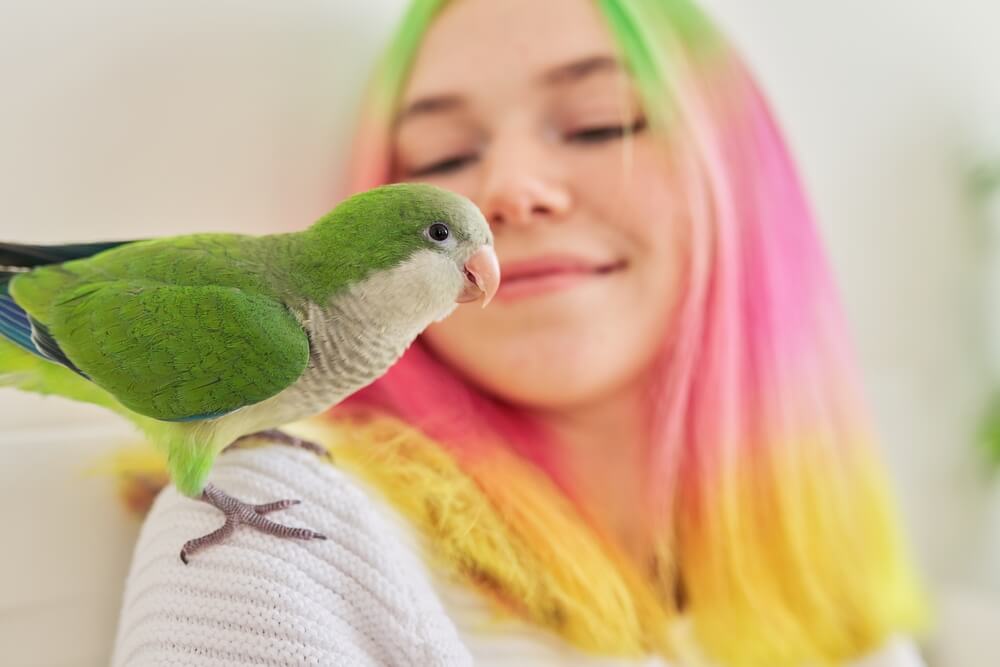
When your Quaker parrot is purring, it means they feel safe, comfortable, and happy with their environment and their companions. However, there are several factors that can influence whether or not your Quaker parrot will purr.
Here are some of the most common factors:
Environmental Factors
The environment in which your Quaker parrot lives can have a significant impact on whether or not they purr. Some of the environmental factors that can influence your bird’s purring behavior include:
- Temperature: Quaker parrots are sensitive to temperature changes. If your bird is too hot or too cold, they may not feel comfortable enough to purr.
- Lighting: Quaker parrots are diurnal birds, which means they are most active during the day. If your bird is kept in a dark or poorly lit room, they may not feel comfortable enough to purr.
- Noise: Quaker parrots are social birds that thrive on interaction with their owners. If your bird is kept in a noisy environment, they may not feel comfortable enough to purr.
Health Factors
The health of your Quaker parrot can also have a significant impact on whether or not they purr. Some of the health factors that can influence your bird’s purring behavior include:
- Diet: Quaker parrots require a balanced diet that includes a variety of fruits, vegetables, grains, and protein sources. If your bird is not getting the nutrients they need, they may not feel well enough to purr.
- Exercise: Quaker parrots are active birds that require plenty of exercise to stay healthy. If your bird is not getting enough exercise, they may not feel well enough to purr.
- Illness: Quaker parrots are susceptible to a variety of illnesses, including respiratory infections, psittacosis, and feather plucking. If your bird is sick, they may not feel well enough to purr.
By paying attention to these factors, you can help ensure that your Quaker parrot feels comfortable, happy, and healthy enough to purr.
If you have any concerns about your bird’s health or behavior, consult with a veterinarian who specializes in avian medicine.
Interpreting Quaker Parrot Purring
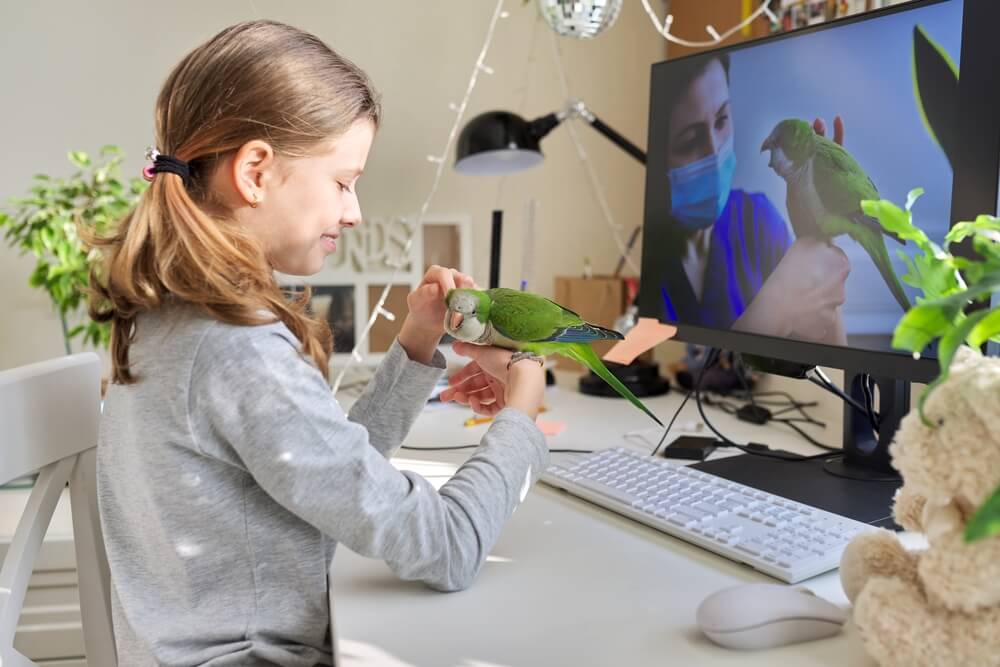
When your Quaker parrot purrs, it can mean a variety of things. It is important to understand the context of the situation and the body language of your bird to interpret the meaning behind the purring.
In this section, we will discuss the positive and negative interpretations of Quaker parrot purring.
Positive Interpretations
- Happiness and Contentment: Quaker parrots often purr when they feel safe, comfortable, and happy with their environment and their companions. Purring can be a sign of relaxation and contentment.
- Affection and Bonding: Purring can also be a sign of affection and bonding. Your Quaker parrot may purr when you pet or cuddle them, indicating that they enjoy your company and feel close to you.
- Playfulness: Quaker parrots are known for their playful personalities, and they may purr when they are in a playful mood. Purring can be a sign that your bird is feeling energetic and wants to engage in playtime with you.
Negative Interpretations
- Stress and Anxiety: Purring can also be a sign of stress and anxiety in Quaker parrots. If your bird is purring while fluffed up, huddled in a corner, or displaying other signs of fear or discomfort, it may be a sign that they are feeling stressed.
- Illness or Pain: Purring can also be a sign of illness or pain in Quaker parrots. If your bird is purring while exhibiting other symptoms such as lethargy, loss of appetite, or difficulty breathing, it may be a sign that they are unwell and in need of veterinary care.
It is important to pay attention to your Quaker parrot’s body language and behavior in addition to their vocalizations to accurately interpret their purring.
If you are unsure about the meaning behind your bird’s purring, consult with a veterinarian or avian behaviorist for guidance.
Conclusion
In conclusion, it is quite normal behavior for Quaker parrots and other birds to produce a sound that is often compared to the contented rumbling of a cat.
While some birds may purr when they are happy, others may do it when they are scared or anxious.
As a Quaker parrot owner, it is important to understand your bird’s body language and vocalizations to determine the reason behind their purring. If your bird is purring while fluffing up its feathers and closing its eyes, it is most likely a sign of contentment and happiness.
However, if your bird is purring while crouching down and looking scared, it could be a sign of fear or anxiety.
It is also important to note that not all Quaker parrots will purr, and some may have different vocalizations that indicate their happiness or contentment.
As with any pet, it is important to spend time with your Quaker parrot and learn their unique behaviors and vocalizations to better understand their needs and emotions.
Overall, purring in Quaker parrots is a fascinating behavior that adds to the uniqueness of these intelligent and social birds.
By understanding their vocalizations and body language, you can provide a happy and healthy environment for your feathered friend.
Frequently Asked Questions
What are the different sounds Quaker parrots make?
Quaker parrots are known for their vocalizations, and they make a variety of sounds. Some common sounds include chirping, chattering, whistling, and squawking. They can also mimic human speech and other sounds they hear in their environment.
If you’re not sure what a particular sound means, pay attention to your bird’s body language to help you interpret it.
How do Quaker parrots show happiness?
When Quaker parrots are happy, they may display a range of behaviors. They may puff up their feathers, wag their tails, or bob their heads. They may also make contented sounds like purring or soft chattering.
If your Quaker parrot is relaxed and comfortable around you, that’s a good sign that they are happy.
What does it mean when a Quaker parrot puffs up?
Puffing up is a common behavior in Quaker parrots, and it can mean different things depending on the context. If your bird is puffing up and making contented sounds like purring, it’s likely a sign that they are relaxed and comfortable.
On the other hand, if your bird is puffing up and hissing or squawking, it could be a sign of aggression or fear.
What are common vocalizations of Quaker parrots?
Quaker parrots are known for their vocalizations, and they make a variety of sounds. Some common sounds include chirping, chattering, whistling, and squawking. They can also mimic human speech and other sounds they hear in their environment.
If you’re not sure what a particular sound means, pay attention to your bird’s body language to help you interpret it.
What are signs of Quaker parrot mating behavior?
Quaker parrots may display a range of behaviors when they are in breeding mode. They may become more vocal and active, and they may spend more time preening themselves or their mate. They may also become territorial and aggressive towards other birds or people.
If you notice these behaviors in your Quaker parrot, it’s important to provide them with a safe and comfortable environment to mate in.
Why do Quaker parrots make crying noises?
Quaker parrots may make crying or whimpering sounds for a variety of reasons. Sometimes they make these sounds when they are feeling anxious or scared, while other times they may make them when they are feeling contented or relaxed.
If you notice your Quaker parrot making crying noises, pay attention to their body language to determine what they are feeling.

